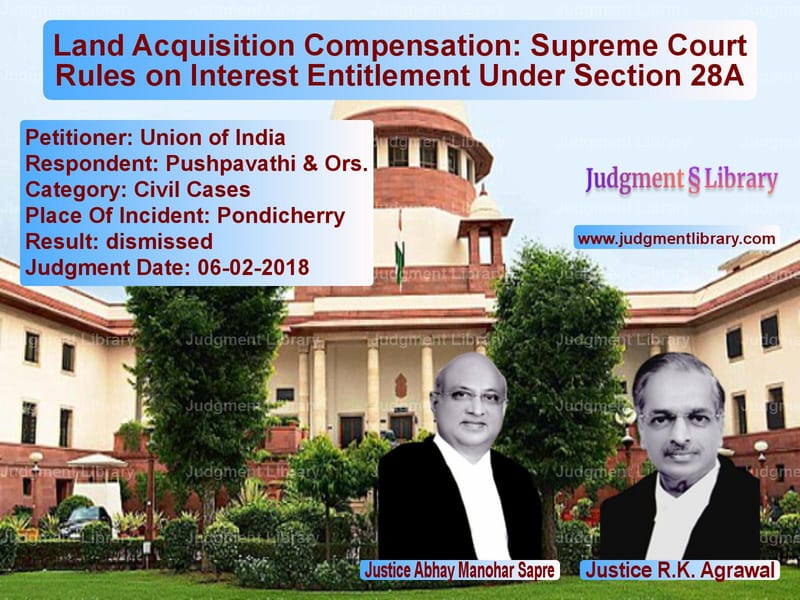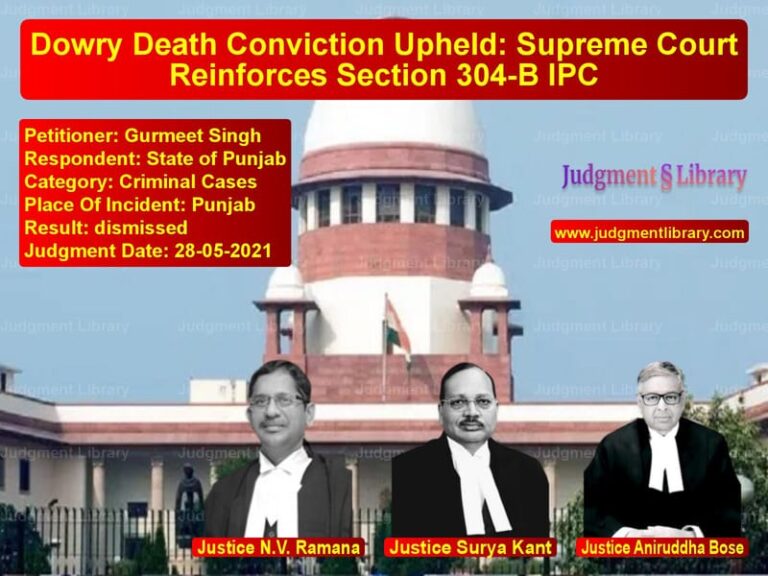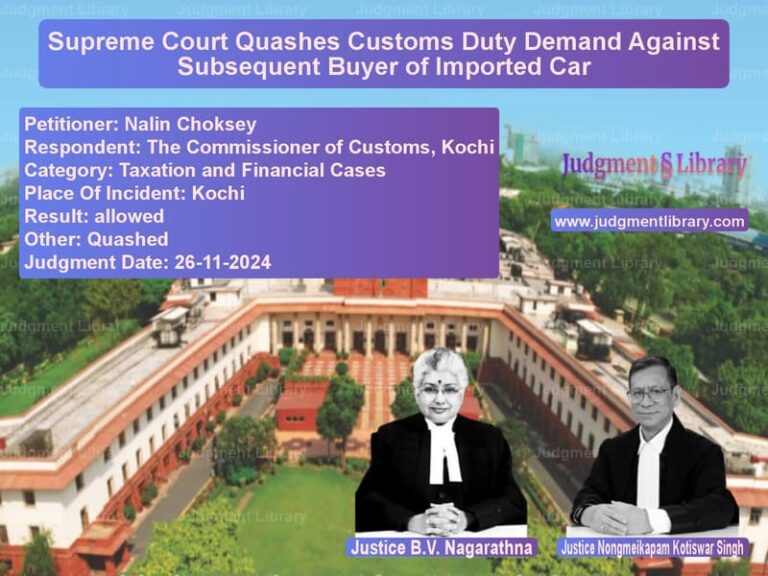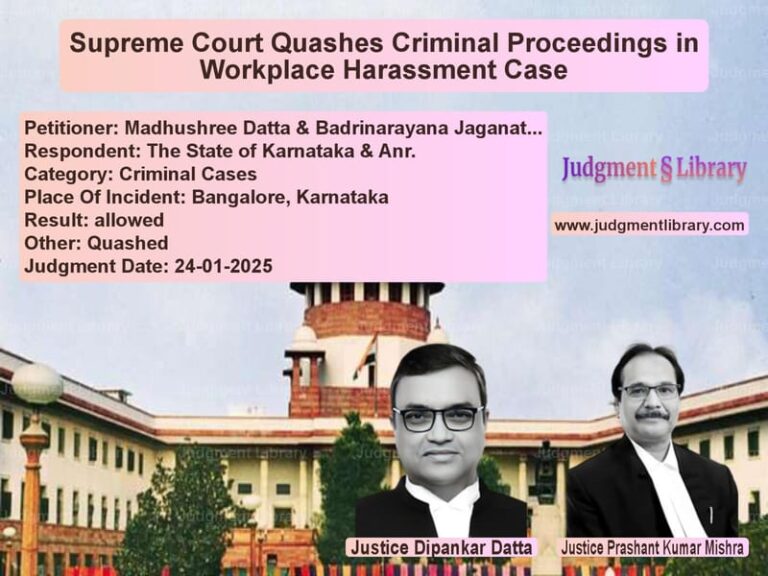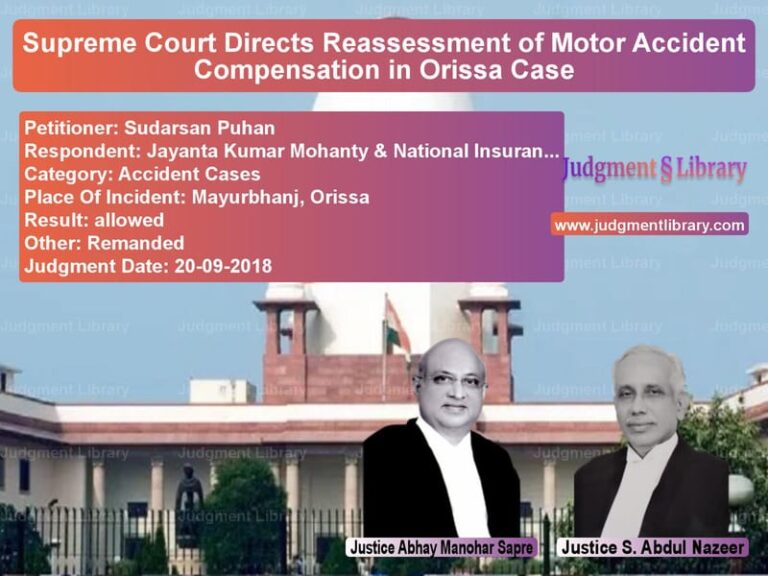Land Acquisition Compensation: Supreme Court Rules on Interest Entitlement Under Section 28A
The Supreme Court of India recently ruled on a significant matter concerning land acquisition and compensation in Union of India & Anr. v. Pushpavathi & Ors.. The case revolved around whether landowners were entitled to interest on compensation under Section 28A of the Land Acquisition Act, 1894. The judgment addressed key legal questions related to procedural remedies and the scope of writ jurisdiction under Article 226 of the Constitution.
Background of the Case
The dispute arose when the Government of Pondicherry issued a notification under Section 4 of the Land Acquisition Act, 1894, on December 22, 1986, seeking to acquire land in Pillaichavadi village for the establishment of a Central University. This was followed by a Section 6 declaration on March 12, 1987. The Land Acquisition Officer (LAO) passed an award on June 1, 1987, fixing the compensation at Rs. 318 per Are.
One of the landowners, dissatisfied with the compensation, sought reference under Section 18 of the Act. The Reference Court, in its award dated May 9, 1989, enhanced the compensation to Rs. 1868 per Are. Following this, the respondents (landowners) applied for redetermination of compensation under Section 28A of the Act. The Collector, upon review, redetermined the compensation but did not award interest on the revised amount. The landowners challenged this decision before the High Court.
Arguments Presented
Petitioners (Union of India)
The Union of India, represented by Senior Counsel Mr. R. Venkataramani, raised the following objections:
- The High Court should not have entertained the writ petitions as the landowners had an alternative statutory remedy under Section 28A(3) read with Section 18 of the Act.
- The non-award of interest by the Collector was part of the award and could only be challenged through reference to the Civil Court under Section 18.
- The Land Acquisition Act is a complete code and provides an explicit mechanism for resolving disputes related to compensation. Hence, bypassing this framework through writ jurisdiction was inappropriate.
Respondents (Landowners)
The landowners argued that:
- The Collector’s failure to grant interest was a clear violation of statutory provisions, warranting judicial intervention.
- The refusal to award interest deprived them of fair compensation, as per the legislative intent behind Sections 28 and 34 of the Act.
- The High Court had correctly exercised its writ jurisdiction as the issue involved a fundamental right to just compensation.
Supreme Court’s Analysis
The Supreme Court analyzed key provisions of the Land Acquisition Act, particularly Sections 11, 18, 23, 26, 28, 28A, and 34. It noted that while Section 28A allows for redetermination of compensation, it does not explicitly address the grant of interest.
Key Observations
- Statutory Right to Interest: The Court emphasized that interest under Sections 28 and 34 is a statutory entitlement that cannot be arbitrarily denied.
- Scope of Writ Jurisdiction: The Court held that the High Court was justified in exercising its writ jurisdiction as the landowners were denied a statutory benefit without justification.
- Distinguishing Reference Proceedings: The Court clarified that reference proceedings under Section 18 pertain to disputes over measurement, compensation quantum, or apportionment. However, denial of statutory interest is a distinct issue that does not necessitate a reference.
- Legislative Intent: The Court reaffirmed that the Land Acquisition Act must be interpreted to ensure just compensation for landowners, including interest on delayed payments.
Supreme Court’s Decision
The Supreme Court dismissed the Union of India’s appeals and upheld the High Court’s judgment. It directed that interest be granted to the landowners as per statutory provisions. The Court concluded:
“The dispute in relation to non-award of interest can be raised by an aggrieved person only by taking recourse to Article 226 of the Constitution in a writ petition. In other words, reference under Section 18 or Section 28A(3) cannot be considered to be an alternative statutory remedy available to the landowner for getting the question of non-award of interest payable under Sections 28 or 34 of the Act decided by the Civil Court.”
Implications of the Judgment
This judgment is a landmark ruling that strengthens landowners’ rights in land acquisition cases. It ensures that statutory benefits, including interest on compensation, are not denied due to procedural technicalities. The ruling also underscores the importance of the judiciary’s role in protecting individuals from arbitrary administrative actions.
Key Takeaways:
- Landowners are entitled to interest under Sections 28 and 34, even in cases of redetermination under Section 28A.
- The High Court can intervene under Article 226 if statutory entitlements are denied.
- The ruling prevents misuse of procedural barriers to deny rightful compensation.
The judgment reinforces the constitutional commitment to ensuring fair compensation in land acquisition matters and sets a precedent for future cases involving similar disputes.
Petitioner Name: Union of IndiaRespondent Name: Pushpavathi & Ors.Judgment By: Justice Abhay Manohar Sapre, Justice R.K. AgrawalJudgment Date: 06-02-2018
Don’t miss out on the full details! Download the complete judgment in PDF format below and gain valuable insights instantly!
Download Judgment: Union of India vs Pushpavathi & Ors. Supreme Court of India Judgment Dated 06-02-2018.pdf
Direct Downlaod Judgment: Direct downlaod this Judgment
See all petitions in Damages and Compensation
See all petitions in Property Disputes
See all petitions in Contract Disputes
See all petitions in Judgment by Abhay Manohar Sapre
See all petitions in Judgment by R K Agrawal
See all petitions in dismissed
See all petitions in supreme court of India judgments February 2018
See all petitions in 2018 judgments
See all posts in Civil Cases Category
See all allowed petitions in Civil Cases Category
See all Dismissed petitions in Civil Cases Category
See all partially allowed petitions in Civil Cases Category

